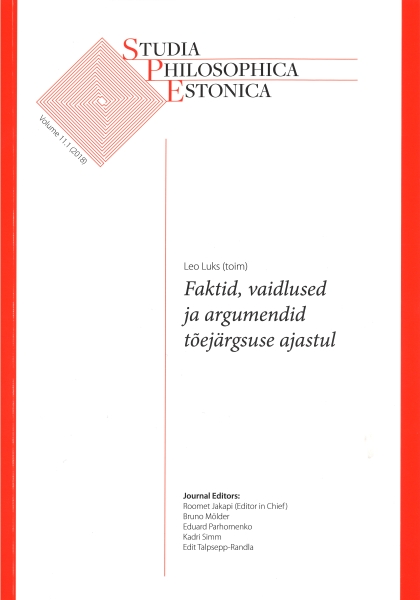“there are no facts. . . ”: Nietzsche as Predecessor of Post-Truth?
DOI:
https://doi.org/10.12697/spe.2018.11.1.03Keywords:
relativism, truth, certainty, perspectivismAbstract
In light of recent political events Nietzsche was (again) charged as proponent of unscrupulous power-politics and as predecessor of “post-truth.” A passage from his late notes is notoriously quoted to denounce him as figurehead of relativism, truth-denial and post-factual attitudes: “facts are precisely what there is not, only interpretations.” By means of an analysis of this passage and its 19h century contexts, the paper reconstructs Nietzsche’s criticism of absolute truth. He problematizes notions of truth on the basis of epistemological, physiological, historical, and sociological considerations, arguing in favour of self-reflexive, pluralistic, and modest epistemic attitudes, which are occasionally associated with relativism. Unlike certain cliché-versions of relativism Nietzsche denies that every “perspective” is equally valid, and develops and employs a variety of interpretational and argumentative standards. ese standards are not absolute, but allow human evaluations of knowledge-claims. The proposed alternative between “truth” or “post-truth” construes a false opposition and underestimates the need for informed value judgments in politics and culture. In conclusion it is argued that prosecutors and defendants of “post-truth” are similarly vulnerable for resentful dogmatic ideologies, because of unwillingness or inability to accept and employ a post-absolutist loss of certainty.
References
Baghramian, Maria (2004): Relativism. The Problems of Philosophy. London: Routledge.
Baghramian, Maria (2010): A Brief History of Relativism, in: Michael Krausz (ed.): Relativism. A Contemporary Anthology, New York: Columbia University Press, 31-50.
Blackburn, Simon: Truth. A Guide for the Perplexed London: Penguin, 2005.
Comte, Auguste (1855): Appel aux Conservateurs, Paris: E. Thunot.
Comte, Auguste (1880): Einleitung in die positive Philosophie. German by H.G. Schneider, Leipzig: Fues.
Grote, John (1865): Exploratio Philosophica. Rough Notes on Modern Intellectual Science. Part I, Cambridge: Deighton.
Guyau, Jean Marie (1887): L’irrÉligion de l’avenir. Etude sociologique. Paris: F. Alcan
Heit, Helmut, Günter Abel and Marco Brusotti (eds. 2014): Nietzsches Wissenschaftsphilosophie. Hintergründe, Wirkungen und Aktualität, Berlin: de Gruyter.
Higgins, Kathleen (2016): “Post-truth - A Guide for the perplexed” in: Nature Vol. 450 (1. Dec. 2016), 9.
Lange, Friedrich Albert (1866): Geschichte des Materialismus und Kritik seiner Bedeutung in der Gegenwart, Iserlohn: Baedecker.
Lange, Friedrich Albert (1882): Geschichte des Materialismus und Kritik seiner Bedeutung in der Gegenwart, revised second edition, Iserlohn: Baedecker
Mill, John Stuart (1874): Auguste Comte und der Positivismus. Translated into German by Elise Gomperz, in Theodor Gomperz (ed.): John Stuart Mills Gesammelte Werke IX. Leipzig: Fues.
Moore, Gregory and Thomas H Brobjer (eds. 2004): Nietzsche and Science. Aldershot: Ashgate.
Nietzsche, Friedrich (1988 [1884-85]): Nachgelassene Fragmente 1884 - 1885. Edited by Giorgio Colli and Mazzino Montinari (Kritische Studienausgabe Volume 11) Berlin; München: de Gruyter; dtv.
Nietzsche, Friedrich (1996 [1878]): Human All too Human. A Book for Free Spirits. Edited by Richard Schacht and translated by R. J. Hollingdale. Cambridge: Cambridge University Press.
Nietzsche, Friedrich (1997 [1874]): Untimely Meditations III. Schopenhauer as Educator. Edited by Daniel Breazeale and transl. by R.J. Hollingdale. Cambridge: Cambridge University Press.
Nietzsche, Friedrich (1999 [1872]): The Birth of Tragedy. Edited by Raymond Geuss and transl. by Roland Speirs. Cambridge: Cambridge University Press.
Nietzsche, Friedrich (2001 [1885]): Beyond Good and Evil. Prelude to a Philosophy of the Future. Edited by Hans Peter Horstmann and transl. by Judith Norman. Cambridge: Cambridge University Press.
Nietzsche, Friedrich (2003): Writings from the Late Notebooks. Edited by RÜdiger Bittner and transl. by Kate Sturge. Cambridge: Cambridge University Press.
Oxford Dictionaries (2016): “Word of the year 2016 is … post-truth” in: https://en.oxforddictionaries.com/word-of-the-year/word-of-the-year-2016
Piazzesi, Chiara (2016): “Nietzsche and Sociology”, in: Helmut Heit & Lisa Heller (ed.): Handbuch Nietzsche und die Wissenschaften. Natur-, geistes- und sozialwissenschaftliche Kontexte, Berlin: de Gruyter, 341-361.
Ralph Keyes (2004) The Post-Truth Era: Dishonesty And Deception In Contemporary Life (St. Martin Press)
Schiemann, Gregor (2008): Hermann von Helmholtz’s Mechanism. The Loss of Certainty. A Study on the Tradition from Classical to Modern Philosophy of Nature. (transl. by Cynthia Klohr) Luxemburg: Springer.
Schiemann, Gregor (2016): Nietzsche und die Wahrheitsgewissheitsverluste im Anbruch der Moderne, in: Helmut Heit and Lisa Heller (ed.): Handbuch Nietzsche und die Wissenschaften. Natur-, geistes- und sozialwissenschaftliche Kontexte, Berlin: de Gruyter, 46-75.
Schopenhauer, Arthur (1873): Die Welt als Wille und Vorstellung. Erster Band. Vier Bücher, nebst einem Anhange, der die Kritik der Kantischen Philosophie enthält [1818], in: Julius Frauenstädt (ed.): Arthur Schopenhauer. Sämtliche Werke. Vol. Leipzig: F. A. Brockhaus.
Stack, George J. (1983): Lange and Nietzsche, Berlin: de Gruyter.
Wehner, Peter (2016): “The Theology of Donald Trump” in: The New York Times July 2016 (https://www.nytimes.com/2016/07/05/opinion/campaign-stops/the-theology-of-donald-trump.html)





